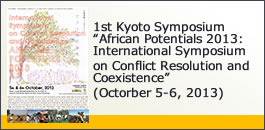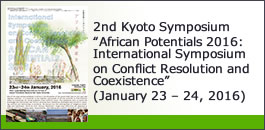[13th Meeting of Research Unit on Politics and International Relations / 23rd Public Workshop] “Land and Agrarian Reform in Zimbabwe: Social and Structural Implications” (March 9, 2015)
Date: March 9 (Monday), 2015, 16:00 – 18:00
Venue: Collaboration room 1 on the 4th floor, Building 18, Komaba Campus, The University of Tokyo
Co-organized by
-Kanto branch of Japan Association for African Studies (JAAS-Kanto)
-Graduate Program on Human Security (HSP), The University of Tokyo
-Center for African Studies, Institute for Advanced Global Studies (IAGS)
Program
Title: Land and Agrarian Reform in Zimbabwe: Social and Structural Implications
Presenter: Prof. Sam Moyo (Executive Director of African Institute for Agrarian Studies, Zimbabwe & Visiting Professor at Kyoto University)
Moderator: Prof. Yoichi Mine (Doshisha University)
Abstract
Thirty years of land reform, including the fast track programme of 2000, unraveled the settler-colonial ‘labour reserve’ of Zimbabwe. It redistributed 90% of the land held in 1980 by 6000 large-scale white farmers to about 300 000 black owned farming units by 2014. A tri-modal agrarian structure, consisting of an expanded peasantry, numerous small and medium sized capitalist farms, and large-scale agroindustrial estates, has been established. Agrarian production and societal relations are now based on relatively more equitable relations of land ownership; differentiated forms of integration into domestic and external markets to sale food and commodities; varied forms of family and wage labour relations; and varied accumulation strategies, reflected in capital formation and non-farm investments. Zimbabwe is unique in that it has rowed against the current trend of foreign land grabbing and challenging the contemporary scramble for Africa, but whether it can sustain an introverted process of accumulation ‘from below’ is an open question. The emerging contradictions include new forms of labour exploitation, the incipience of informal land markets, the renewed dominance of exports such as tobacco, cotton, sugar and tea at the expense of food grains, and the re-insertion of finance capital through export-oriented contract farming and expensive credit.
[12th Meeting of Research Unit on Politics and International Relations] “Presentation meeting for publication of results of the project” (January 24, 2015)
Date: January 24, 2015
Venue: Middle-sized seminar room, 3F Inamori Center, Kyoto University
Program
Presentation meeting for publication of results of the project
Report
Each author has presented outline of the manuscript and discussed with other participants in the meeting. The participants also discussed title and composition of the book and schedule for publication planning.
[11th Meeting of Research Unit on Politics and International Relations / 21st Public Workshop / 10th Meeting of Research Cluster on West Africa] “Informalization and Its Discontents & Violent Islamic Radicalization” (Co- organized by the 29th Kyoto University African Studies Seminar (KUASS)) (November 21, 2014)
Date: November 21, 2014. 14:00-17:00
Venue: Middle-sized seminar room, 3F Inamori Center, Kyoto University
Program
Prof Abdul Raufu Mustapha (Oxford University)
Violent Islamic Radicalization:Northern Nigeria in the light of the experience of southern Niger Republic
Kate Meagher (London School of Economics)
Informalization and Its Discontents: The Informal Economy and Islamic Radicalization in Northern Nigeria
Abstract
Mustapha, A. Raufu
Violent Islamic Radicalization: Northern Nigeria in the light of the experience of southern Niger Republic
At first glance, northern Nigeria and southern Niger Republic share a number of important religious, economic, and social characteristics.
- Both belong to the sahelian cultural belt just south of the Sahara, running from Senegal to Somalia; a zone in which Islam has exercised significant influence for over a thousand years.
- The two regions are also united by the prevalence the Hausa language.
- Both are regrettably regions of high levels of poverty and depressed socio-economic indicators.
- Finally, they both share a complex admixture of sectarian communities of Sufi Brotherhoods and reformist strands of Islam.
Since the early 19th century, religious and political ideas, religious groups, economic actors, and political forces have moved back and forth across the boundary between both regions. In the process, events in one region have tended to have ramifications for developments in the other. For instance, the Sokoto jihad of 1804 spread Qadiriyya Brotherhood influence to the territories that are now in Niger Republic and many ‘of the wealthiest merchants of Niger belong to this order, whose members are referred to locally as ‘yan sadalu’. Similarly, the Tijaniyya-Ibrahimiyya Brotherhood was spread from Kano to Niger in the 1950s and its members are known locally as the ‘yan kabalu’. Significantly, the Qadiriyya-Tijaniyya conflicts which racked Nigeria in the 1950s and 1960s also took place in Niger. In the same vein, the reformist Salafist Nigerian sect, Izala, also made an appearance in Niger Republic in the 1980s, having been formed in Nigeria. As in Nigeria, the appearance of this reformist Salafist sect generated high levels of religious discord with the established Sufis in Niger. And as happened in Nigeria, Izala also broke into two main factions.
Though the flow and ebb of ideas and people go in both directions, there is the recognition of Nigeria’s formidable cultural, religious, and economic influence on Niger. This is captured in the Nigerien saying: ‘When Nigeria has a cold, Niger coughs’.
Since 2009, northern Nigeria has been battling a stubborn Islamist insurgency spear-headed by the Boko Haram. Analysts have been speculating on the possible consequence of this insurgency for Niger Republic, given the shared characteristics between both regions. Why has there not been the development of a similar insurgency in Niger? This lecture reflects on this question. The lecture compares the drivers of possible radicalization in both regions, looking specifically at: (a) the variable cultural geographies of within and between the two region; (b) impact of historical forces; (c) the importance of economic processes; (d) the political and administrative dynamics in both regions; and (e) religious factors, especially the place of Christianity in both regions and the prevalence of some religious ideas such as secularism. Through such a comparison, it should become clearer why, despite their seeming similarities, violent Islamist radicalization remains dormant in southern Niger but active in northern Nigeria.
Meagher, K.M.B. Kelly (London School of Economics)
Informalization and Its Discontents: The Informal Economy and Islamic Radicalization in Northern Nigeria
This seminar explores the dark side of inclusive markets in the context of northern Nigeria. It examines how strategies of economic inclusion generate new dynamics of exclusion through processes of selective inclusion and marginalization. Despite the celebrated resurgence of the Nigerian economy, the majority of the population has remained trapped in the realities of jobless growth, rising poverty and expanding economic informality. The interface of historical disadvantage, economic reforms, and the dynamics of the global economy have exacerbated problems of regional inequality within Nigeria, concentrating the benefits of inclusive markets in the south and the negative side-effects in the northern region of the country, fostering escalating poverty, disaffection and Islamic extremism.
Drawing on fieldwork conducted in the northern Nigerian cities of Kano and Kaduna in 2014, I will explore the nature and limitations of inclusive economies within the context of northern Nigeria’s vibrant informal economy. I will focus on how inclusive economies have exacerbated economic stress within northern Nigeria, and generated new and increasingly problematic processes of exclusion. Based on interviews with operators and associational leaders in a selection of eight common informal production and service activities, I show how mounting economic pressures are restructuring patterns of ownership, social identity, educational attainment and religious affiliation within the informal economy. Indigenous institutions and networks of religious tolerance and economic interdependence are being eroded by new patterns of competition over access to informal jobs based on education and identity. Popular disaffection is heightened by human rights abuses by security forces and graduate employment programmes, which further marginalize poor and less-educated informal actors, exacerbating economic stress and resentment against the state, and creating a tinderbox for violence and Islamic extremism.
[10th Meeting of Research Unit on Politics and International Relations / 9th Meeting of Research Cluster on West Africa] “Islamic Radicalization in Nigeria” (November 19, 2014)
Date: November 19, 2015. 16:00 – 18:00
Venue: Collaboration room 1 on the 4th floor, Building 18, Komaba
Campus, The University of Tokyo
Program
Prof Abdul Raufu Mustapha (Oxford University)
Violent Islamic Radicalization:Northern Nigeria in the light of the experience of southern Niger Republic
Informalization and Its Discontents: The Informal Economy and Islamic Radicalization in Northern Nigeria
Abstract
Mustapha, A. Raufu
Violent Islamic Radicalization: Northern Nigeria in the light of the experience of southern Niger Republic
At first glance, northern Nigeria and southern Niger Republic share a number of important religious, economic, and social characteristics.
- Both belong to the sahelian cultural belt just south of the Sahara, running from Senegal to Somalia; a zone in which Islam has exercised significant influence for over a thousand years.
- The two regions are also united by the prevalence the Hausa language.
- Both are regrettably regions of high levels of poverty and depressed socio-economic indicators.
- Finally, they both share a complex admixture of sectarian communities of Sufi Brotherhoods and reformist strands of Islam.
Since the early 19th century, religious and political ideas, religious groups, economic actors, and political forces have moved back and forth across the boundary between both regions. In the process, events in one region have tended to have ramifications for developments in the other. For instance, the Sokoto jihad of 1804 spread Qadiriyya Brotherhood influence to the territories that are now in Niger Republic and many ‘of the wealthiest merchants of Niger belong to this order, whose members are referred to locally as ‘yan sadalu’. Similarly, the Tijaniyya-Ibrahimiyya Brotherhood was spread from Kano to Niger in the 1950s and its members are known locally as the ‘yan kabalu’. Significantly, the Qadiriyya-Tijaniyya conflicts which racked Nigeria in the 1950s and 1960s also took place in Niger. In the same vein, the reformist Salafist Nigerian sect, Izala, also made an appearance in Niger Republic in the 1980s, having been formed in Nigeria. As in Nigeria, the appearance of this reformist Salafist sect generated high levels of religious discord with the established Sufis in Niger. And as happened in Nigeria, Izala also broke into two main factions.
Though the flow and ebb of ideas and people go in both directions, there is the recognition of Nigeria’s formidable cultural, religious, and economic influence on Niger. This is captured in the Nigerien saying: ‘When Nigeria has a cold, Niger coughs’.
Since 2009, northern Nigeria has been battling a stubborn Islamist insurgency spear-headed by the Boko Haram. Analysts have been speculating on the possible consequence of this insurgency for Niger Republic, given the shared characteristics between both regions. Why has there not been the development of a similar insurgency in Niger? This lecture reflects on this question. The lecture compares the drivers of possible radicalization in both regions, looking specifically at: (a) the variable cultural geographies of within and between the two region; (b) impact of historical forces; (c) the importance of economic processes; (d) the political and administrative dynamics in both regions; and (e) religious factors, especially the place of Christianity in both regions and the prevalence of some religious ideas such as secularism. Through such a comparison, it should become clearer why, despite their seeming similarities, violent Islamist radicalization remains dormant in southern Niger but active in northern Nigeria.
Meagher, K.M.B. Kelly (London School of Economics)
Informalization and Its Discontents: The Informal Economy and Islamic Radicalization in Northern Nigeria
This seminar explores the dark side of inclusive markets in the context of northern Nigeria. It examines how strategies of economic inclusion generate new dynamics of exclusion through processes of selective inclusion and marginalization. Despite the celebrated resurgence of the Nigerian economy, the majority of the population has remained trapped in the realities of jobless growth, rising poverty and expanding economic informality. The interface of historical disadvantage, economic reforms, and the dynamics of the global economy have exacerbated problems of regional inequality within Nigeria, concentrating the benefits of inclusive markets in the south and the negative side-effects in the northern region of the country, fostering escalating poverty, disaffection and Islamic extremism.
Drawing on fieldwork conducted in the northern Nigerian cities of Kano and Kaduna in 2014, I will explore the nature and limitations of inclusive economies within the context of northern Nigeria’s vibrant informal economy. I will focus on how inclusive economies have exacerbated economic stress within northern Nigeria, and generated new and increasingly problematic processes of exclusion. Based on interviews with operators and associational leaders in a selection of eight common informal production and service activities, I show how mounting economic pressures are restructuring patterns of ownership, social identity, educational attainment and religious affiliation within the informal economy. Indigenous institutions and networks of religious tolerance and economic interdependence are being eroded by new patterns of competition over access to informal jobs based on education and identity. Popular disaffection is heightened by human rights abuses by security forces and graduate employment programmes, which further marginalize poor and less-educated informal actors, exacerbating economic stress and resentment against the state, and creating a tinderbox for violence and Islamic extremism.
[1st Plenary Committee / 1st Public Lecture] “Conflict Resolution and Coexistence in Africa”(July 2, 2011)
Date: July 2, 2011
Venue: Inamori Foundation Memorial Hall (Inamori Center), Kyoto University
Contents
The greatest obstacles facing modern African society are the impoverishment and disintegration of the social order caused by conflict. In particular, since the 1990s, large-scale civil wars and regional strife have erupted regularly, and multifarious conflicts have been occurring, such as violent clashes over land ownership and use, as well as territorial disputes over political resources. The international society has been seeking a solution to this state of affairs according to the normative values and concepts that originated in the U.S. and Europe, such as liberal democracy.
In response to these issues, our workshop takes an entirely different stance, namely, that the knowledge and institutions created, developed, and employed by African people can also serve to achieve conflict resolution and a state of coexistence. However, such knowledge and institutions are not fixed and unchanging entities within Africa. Rather, they have grown out of Africa’s repeated interaction, both consonant and dissonant, with the outside world. This workshop will strive to consider avenues for leveraging Africa’s knowledge and institutions in order to resolve current disputes and recover a cohesive social structure.
Keywords
Peace-building, Nation-building, Post-conflict, Rwanda, South Sudan
Program
3:30-13:45 Itaru Ohta (Kyoto Unversity)
Introduction
13:45-14:45 Eisei Kurimoto (Osaka University)
Unrestored Peace at the Community Level: Challenges and Limits of Peace-Building in “Post-War” Southern Sudan
14:45-15:00 Break
15:00-16:00 Shinichi Takeuchi (JICA Research Institute)
Rwanda’s Gacaca under Post-Genocide State-Building
Report Overview
Itaru Ohta (Kyoto Unversity)
Introduction
This workshop is a 5-year research project, officially titled “A Comprehensive Regional Study on Conflict Resolution and Coexistence through Leveraging Africa’s Potentials,” which started in academic year 2011 (also the foundational year of the JSPS’s Grants-in-Aid for Scientific Research [S]). Ohta, the representative of the project, explained outline of the project. Modern African society is confronting the formidable obstacles of impoverishment and disintegration of the social order caused by conflict. Ohta argued that in the face of these real-life challenges, instead of importing Western systems and values to the African continent, this project seeks to clarify new avenues for effectively utilizing the knowledge and institutions created, accumulated, and employed by African people (“African Potentials”) such that they can be used to contribute to conflict resolution and social order construction (co-existence). (Reporter: Itaru Ohta)
Eisei Kurimoto (Osaka University)
Unrestored Peace at the Community Level: Challenges and Limits of Peace-Building in “Post-War” Southern Sudan
The second speaker, Kurimoto, talked about the peace-building in “post-war” southern Sudan. Ever since the signing of the 2005 Sudanese Comprehensive Peace Agreement, the government forces and the Sudan People’s Liberation Army (SPLA) have been maintaining peace in southern Sudan (which is scheduled to become independent in July 2011). However, peace at the community level has not been accomplished, and armed conflicts are erupting not only between different communities but also within communities. Although peace discussions are held in certain areas to promote reconciliation at the community level, the results have not been substantive. Furthermore, other regional areas exist where no such initiative has been taken at all. In order to rebuild the society, it is essential to follow “peace from below” approaches that focus on endogenous, community-level peace initiatives, and also organically join these movements with “peace from above” that is implemented by government agencies.
During the question-and-answer session, discussion was generated from questions that included, “What specifically needs to be done to support ‘peace from below’ activities?”; “Who will conjoin the ‘peace from below’ and ‘peace from above’ movements, and how will they do that?”; and “Isn’t it necessary to stimulate business activity on a more individual level rather than just holding peace conferences?” (Reporter: Toru Sagawa)
Shinichi Takeuchi (JICA Research Institute)
Rwanda’s Gacaca under Post-Genocide State-Building
The third speaker, Takeuchi, talked about Rwanda’s post-conflict state-building. On the basis of the World Bank’s governance indexes of “political stability” and “voice and accountability,” three types of post-conflict state-building were distinguished: (1) where both indexes were stagnant (e.g., Afghanistan, Sudan), (2) where the “political stability” index considerably exceeded the “voice and accountability” index (e.g., Rwanda, Angola), and (3) where both indexes showed parallel improvement (e.g., Sierra Leone, Burundi). Regarding the post-conflict state-building, the international community has emphasized the necessity of enhancing not only the state capacity of providing basic social services including security, but also state legitimacy vis-à-vis the society. Among the above-mentioned three types, the first two clearly indicate a gap between the goals promoted by the international community and actual status of state-building. While the type (1) shows the lack of state capacity for the provision of security, the type (2) demonstrates a risk of the authoritarian state-building, which may damage the state legitimacy. In fact, a propensity toward authoritarianism among countries that have experienced serious internal conflict has been so far observed. Examining the experiences of post-conflict state-building in Rwanda, Takeuchi indicated its achievements and challenges. On the one hand, the country has succeeded in maintaining social order under the rule of the Rwandan Patriotic Front, the former rebel led by ethnic minority. On the other hand, the priority of political stability may have hampered the enhancement of liberal democratic governance. Inclusiveness in the governance as well as economic development should be consciously taken into account in its state-building process
During the question-and-answer session, debate centered on the differences in the post-conflict societies in Rwanda and Burundi, the manner in which the conflicts ended, and the great relevance of the degree of involvement of the international society. (Reporter: Shuichi Oyama)
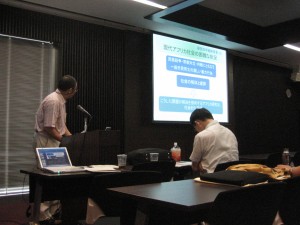
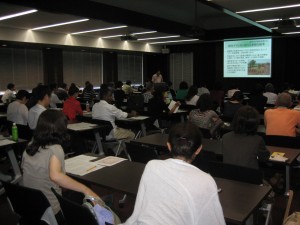
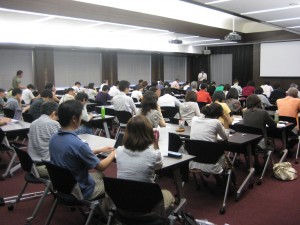
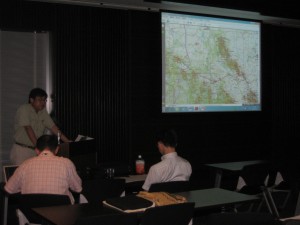
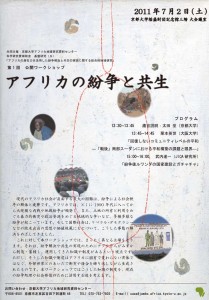

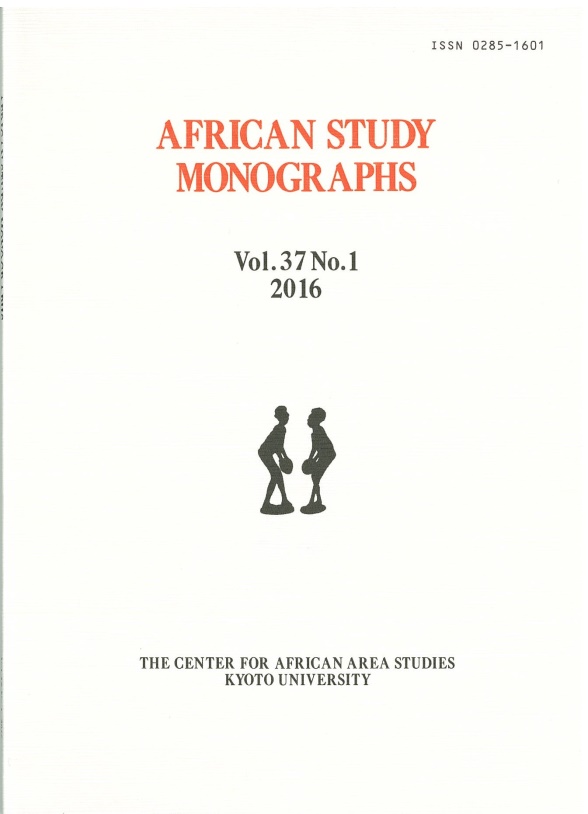
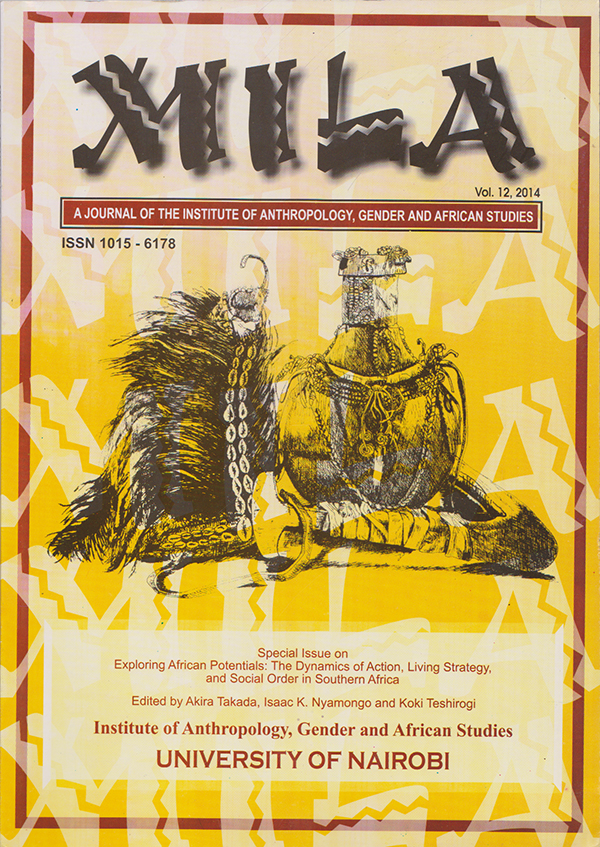 Exploring African Potentials, Mila Special Issue
Exploring African Potentials, Mila Special Issue